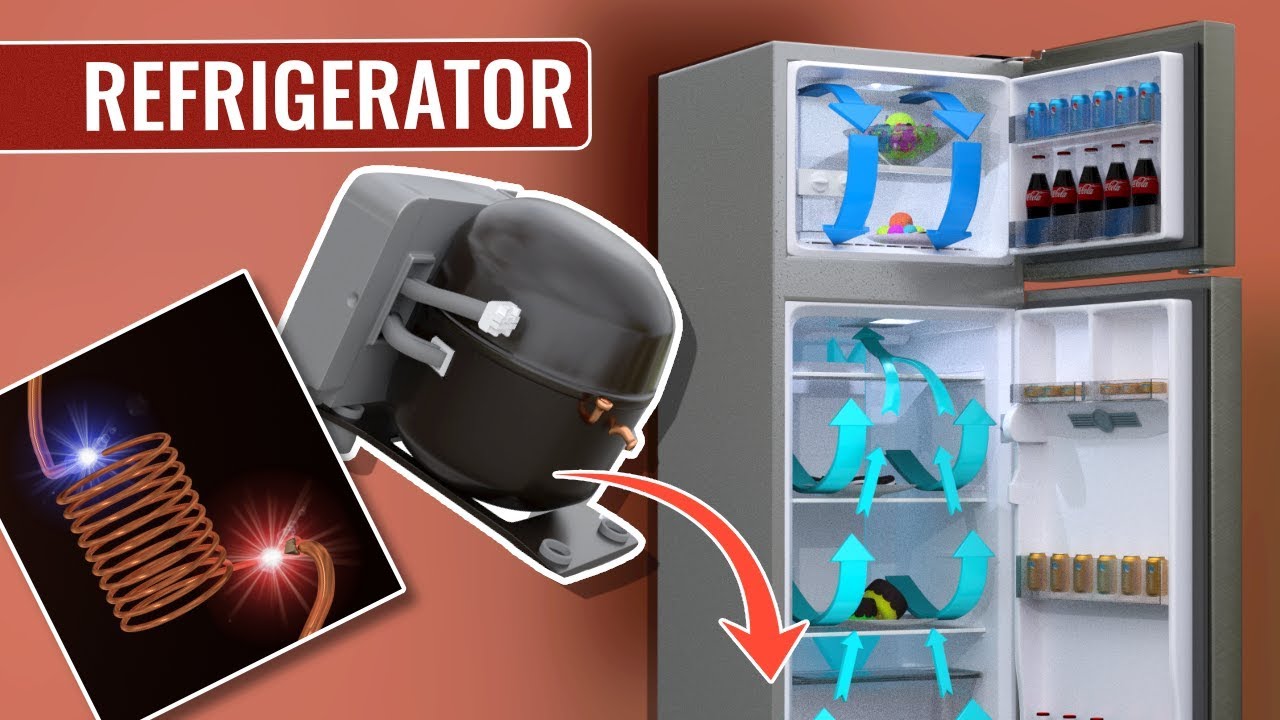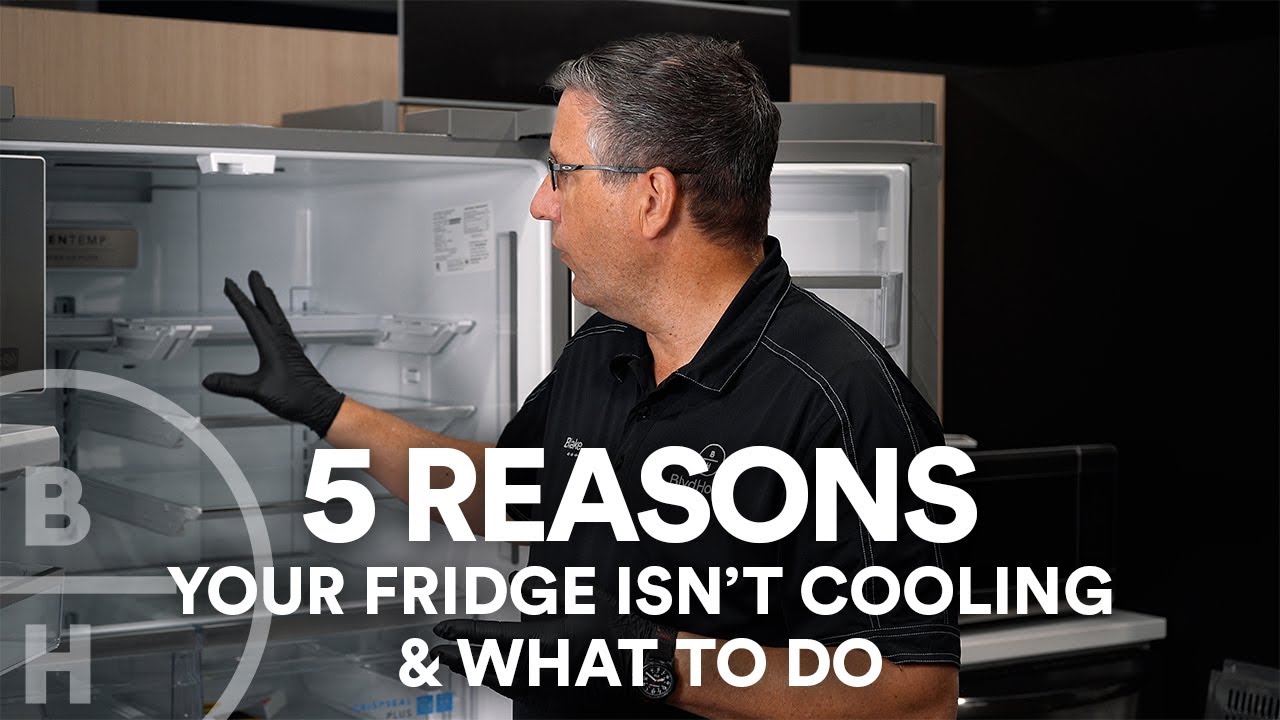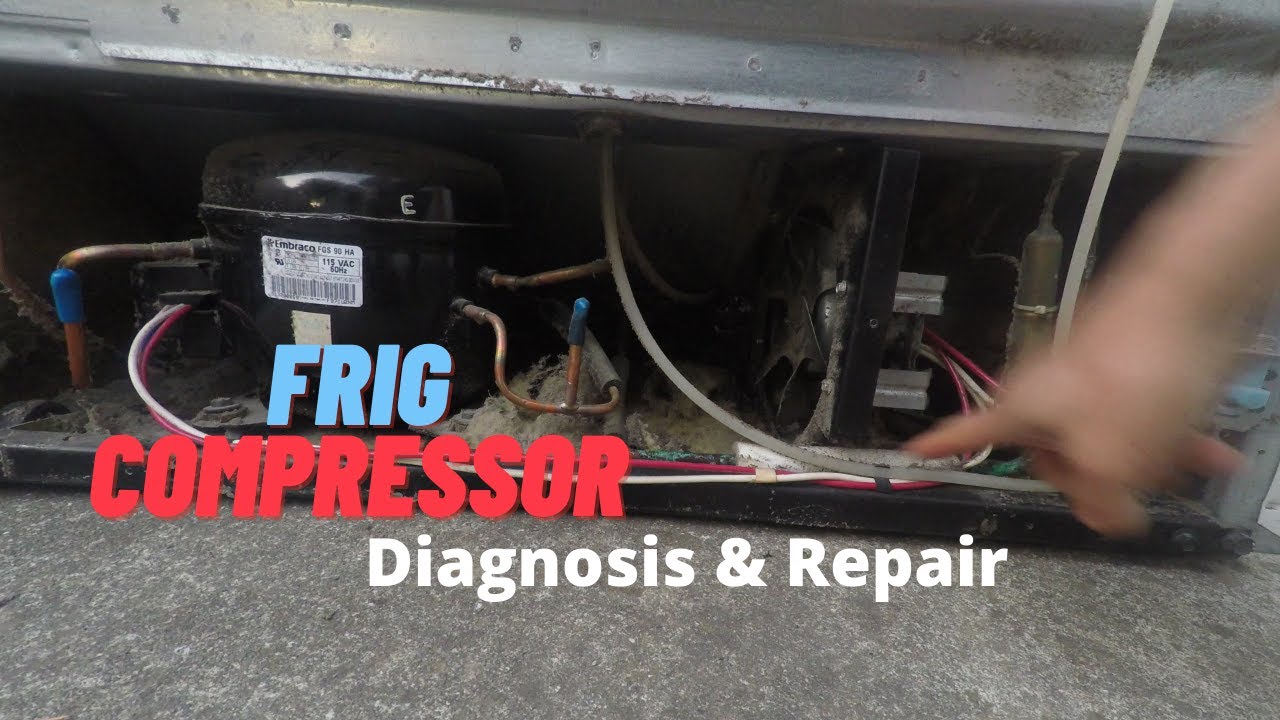In the heart of every refrigerator lies a vital component known as the compressor. This unassuming device plays a crucial role in maintaining the cool temperatures that preserve our food and beverages. However, there are times when a refrigerator might start acting up, not cooling as it should, or exhibiting erratic behavior.
Before calling in the professionals, it's worth exploring the simple yet effective process on how to reset a refrigerator compressor. This guide will walk you through the steps to reset your refrigerator compressor safely and potentially save you from unnecessary expenses.
What Does A Refrigerator Compressor Do?

How does a Refrigerator work?
A refrigerator compressor is a vital component of a refrigeration system that plays a central role in cooling and maintaining the desired temperature inside the refrigerator. Its primary function is to circulate refrigerant gas through the cooling system, which facilitates the transfer of heat from the interior of the refrigerator to the external environment, thereby cooling the contents inside. Here's a breakdown of what a refrigerator compressor does and how it works:
- Circulation of Refrigerant -The compressor takes low-pressure, low-temperature refrigerant gas from the evaporator coils (located inside the refrigerator) and compresses it into high-pressure, high-temperature gas.
- Compression -The compressor compresses the refrigerant gas using mechanical force, which causes the gas molecules to come closer together, resulting in an increase in both pressure and temperature.
- Heat Exchange -The high-temperature, high-pressure gas is then pushed through the condenser coils (located outside the refrigerator). As the gas flows through the condenser coils, it releases heat to the surrounding environment, causing the gas to condense and transform into a high-pressure liquid.
- Expansion Valve -The high-pressure liquid refrigerant is then passed through an expansion valve or capillary tube, where it undergoes a rapid expansion. This expansion causes the refrigerant to become a low-pressure, low-temperature mixture of gas and liquid.
- Evaporation -The now low-pressure refrigerant enters the evaporator coils inside the refrigerator's main compartment. As it evaporates, it absorbs heat from the interior of the fridge, effectively cooling down the contents.
- Continuous Cycle - The cycle repeats continuously, with the compressor continuously drawing in low-pressure, low-temperature gas from the evaporator and compressing it into high-pressure, high-temperature gas. This cycle is what maintains the desired temperature inside the refrigerator, keeping the contents cool and fresh.
What Causes A Refrigerator Compressor To Stop Working?
A refrigerator compressor can stop working due to various factors, ranging from normal wear and tear to more complex technical issues. Here are some common reasons why a refrigerator compressor might stop working:
- Electrical Issues -Compressors rely on electrical components to function properly. Electrical problems such as faulty wiring, blown fuses, tripped circuit breakers, or issues with the start relay can prevent the compressor from receiving the necessary power to run.
- Overheating -Compressors generate heat as they operate, and they are designed with safeguards to prevent overheating. However, if the cooling system (such as the condenser coils) is clogged or dirty, the compressor can overheat, leading to a shutdown. Regular cleaning and maintenance of the cooling components can prevent this issue.
- Start Relay Failure -The start relay is a component that helps the compressor start-up. If the start relay fails, the compressor might struggle to start or fail to start altogether. A faulty start relay can be replaced to restore compressor functionality.
- Mechanical Failures -Internal mechanical components of the compressor, such as the motor or piston, can wear out over time. These failures might result in the compressor being unable to operate as intended.
- Refrigerant Leaks -Refrigerant is essential for the compressor to function properly. If there's a refrigerant leak in the system, the compressor can struggle to maintain the necessary pressure, leading to a shutdown. Refrigerant leaks should be repaired by a professional technician.
- Electrical Component Malfunction -Beyond the compressor itself, various electrical components like capacitors, relays, and overload protectors can fail, preventing the compressor from running.
- Age and Wear -Like any mechanical component, a refrigerator compressor has a finite lifespan. Over time, the wear and tear can lead to decreased efficiency and eventual failure.
- Voltage Fluctuations -Unstable voltage levels, such as power surges or brownouts, can impact the compressor's operation. Voltage fluctuations can stress the electrical components and lead to compressor failure.
- Manufacturing Defects -In rare cases, manufacturing defects or poor-quality components can cause a compressor to fail prematurely.
- Excessive Load -Overloading a refrigerator with warm items, especially in a short period, can cause the compressor to work harder than usual. This increased load can strain the compressor and potentially lead to failure.
- Environmental Factors -Extreme temperature conditions, both hot and cold, can affect the compressor's performance. Extremely low temperatures, in particular, can cause the oil inside the compressor to become too thick, hindering its movement.
How Can I Tell If My Refrigerator Compressor Is Not Working?

Refrigerator not Cooling? Check these things first!
Identifying whether your refrigerator compressor is not working requires some observation and basic troubleshooting. Here are some common signs that can indicate a potential issue with your refrigerator compressor:
- Lack of Cooling -If the refrigerator is not maintaining the desired temperature and your food is not as cold as it should be, the compressor might be struggling to cool properly.
- Unusual Noises -While a certain amount of noise is normal, loud and unfamiliar noises, such as clicking, buzzing, or rattling, could indicate compressor issues. These noises might occur as the compressor tries to start but fails.
- Constant Running or Cycling -If the compressor runs continuously without shutting off, or if it frequently turns on and off rapidly (short-cycling), this could suggest a problem with the compressor or other cooling system components.
- Warm Exterior -If the exterior of the refrigerator feels warm to the touch, it might indicate that the compressor is working too hard or is overheating.
- No Vibrations -Normally, the compressor produces a subtle vibration as it operates. If you don't feel any vibrations, it could indicate that the compressor is not running.
- Noises from the Back -Place your ear close to the back of the refrigerator, near the compressor. If you hear a hum followed by a click or a buzz, it could be a sign that the compressor is trying to start but failing.
- Condenser Fan Issues -The condenser fan, which helps cool the compressor and condenser coils, should run when the compressor is active. If the fan is not working, it can lead to compressor overheating and failure.
- Water Leakage -If you notice water pooling around the refrigerator, it could be a sign of a compressor or cooling system issue. Sometimes, a failing compressor can cause excess condensation.
- Freezer Defrosting -In a refrigerator with a separate freezer compartment, a failing compressor might lead to the freezer section not maintaining its proper temperature, resulting in defrosting or softening of frozen items.
- Burnt Smell -A burnt or acrid smell coming from the refrigerator could indicate an electrical issue, possibly involving the compressor or other components.
- Frequent Spoilage -If food is spoiling quickly or showing signs of spoilage despite proper storage, it might be due to the refrigerator not cooling effectively.
It's important to note that while these signs can point toward a compressor issue, they could also be indicative of other problems within the refrigerator's cooling system. If you notice any of these signs, it's advisable to:
- Check Power -Ensure that the refrigerator is properly plugged in and the circuit breaker hasn't tripped.
- Clean Condenser Coils -Dust and debris on the condenser coils can affect the compressor's performance. Clean them regularly.
- Contact a Professional -If the issues persist or if you're uncertain about troubleshooting, it's best to consult a professional appliance repair technician. They can accurately diagnose the problem and recommend the appropriate solutions.
5 Steps To Reset A Refrigerator Compressor

Refrigerator Compressor Not Running: Diagnosis & Repair or Emergency Fix No More Spoiled Food
Resetting a refrigerator compressor can often resolve minor issues and restore the appliance's functionality. Here are five steps to help you reset a refrigerator compressor:
Power Off The Refrigerator
Unplug the refrigerator from the electrical outlet to ensure your safety while working on the appliance.
Wait For 10-15 Minutes
Give the compressor time to discharge any residual energy by waiting for about 10-15 minutes. This waiting period allows the compressor's internal components to reset.
Set A Timer
While waiting, use a kitchen timer or stopwatch to keep track of the time. This helps ensure that you give the compressor enough time to reset.
Plug In The Refrigerator
After the waiting period, plug the refrigerator back into the electrical outlet securely.
Turn On The Refrigerator
- Locate the control panel of your refrigerator, which might be on the inside near the top or on the front exterior.
- Set the appropriate temperature settings to turn the refrigerator back on.
- Listen for the sound of the compressor and fans running, which indicates that the reset process is successful.
Keep in mind that not all refrigerator models have a manual reset option for the compressor, and some issues might require professional assistance. If the problem persists after attempting the reset, it's advisable to consult your refrigerator's owner's manual for troubleshooting tips or to contact a qualified appliance repair technician for further diagnosis and repair.
How Long Does A Refrigerator Compressor Take To Reset? FAQ
How Long Should I Wait Before Plugging In The Refrigerator After Resetting The Compressor?
It's recommended to wait for about 10-15 minutes after unplugging the refrigerator before plugging it back in. This waiting period allows the compressor's internal components to discharge any residual energy and reset.
What If I Wait Less Than 10 Minutes Before Plugging In The Refrigerator?
Waiting less than the recommended time might not give the compressor sufficient time to reset. It's best to adhere to the suggested waiting period to ensure that the reset process is effective.
Can I Wait Longer Than 15 Minutes Before Plugging In The Refrigerator?
Yes, waiting longer than 15 minutes should not cause any harm. The 10-15 minute window is a general guideline to ensure that the compressor's internal components have enough time to reset.
How Will I Know If The Compressor Has Reset Successfully?
After plugging in the refrigerator and turning it on, you should hear the sound of the compressor and fans running. This indicates that the reset process was successful. If the refrigerator starts cooling properly, it's a positive sign that the reset worked.
What If The Refrigerator Doesn't Start Cooling After The Reset?
If the refrigerator doesn't start cooling or if you continue to experience issues, there might be an underlying problem that requires professional diagnosis and repair. Refer to your refrigerator's owner's manual for troubleshooting tips, or contact an appliance repair technician for assistance.
Can I Perform A Compressor Reset On Any Refrigerator Model?
While many refrigerator models have a manual reset option for the compressor, it's important to consult your refrigerator's owner's manual to ensure that you are following the correct procedure. Additionally, some issues might be more complex and require professional attention.
Are There Any Risks Involved In Resetting The Compressor?
Resetting the compressor itself is generally a safe procedure. However, always prioritize safety by unplugging the refrigerator before attempting any maintenance. If you're unsure about the process or encounter any unexpected issues, consider seeking professional assistance to avoid potential risks or damage.
How Often Can I Reset The Compressor?
Resetting the compressor is not something that should be done frequently. If you find yourself needing to reset the compressor often, it's a sign that there might be an underlying issue with your refrigerator that requires attention from a professional technician.
People Also Ask
How Do I Know If My Refrigerator Compressor Is Bad?
If your refrigerator is not cooling properly, making unusual noises, or constantly cycling on and off, it could be a sign of a bad compressor. Unusual warm temperatures inside the fridge and freezer compartments are also indicators of compressor issues.
How Much Does It Cost To Replace A Refrigerator Compressor?
The cost of replacing a refrigerator compressor can vary widely depending on factors such as the refrigerator's brand, model, age, and whether the compressor is under warranty. On average, compressor replacement costs can range from $300 to $800 or more, including labor.
Can A Refrigerator Compressor Be Repaired?
In some cases, a refrigerator compressor can be repaired, but it depends on the extent of the damage. Minor issues like faulty start relays or capacitors can be replaced. However, major internal compressor damage often requires replacement, as repairs might not be cost-effective.
How Long Should A Refrigerator Compressor Last?
The lifespan of a refrigerator compressor varies, but on average, it can last around 10 to 20 years. Regular maintenance, proper usage, and avoiding overloading the refrigerator can help extend the compressor's lifespan.
Conclusion
The refrigerator compressor stands as a cornerstone of efficient cooling, ensuring that our perishables remain fresh and our beverages delightfully chilled. By mastering the art of resetting this essential component, you gain the power to troubleshoot minor cooling issues on your own. Remember, the process entails caution and patience, ensuring that the compressor's internal mechanisms are given ample time to reset.
With this guide at your disposal, you can confidently navigate the process of resetting your refrigerator compressor, welcoming back the reliable cooling that keeps your kitchen humming. However, if complexities persist, don't hesitate to seek professional assistance - because a well-functioning refrigerator is an investment in the freshness of your everyday life.
